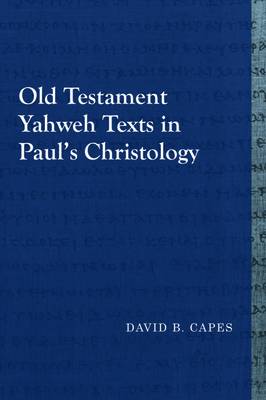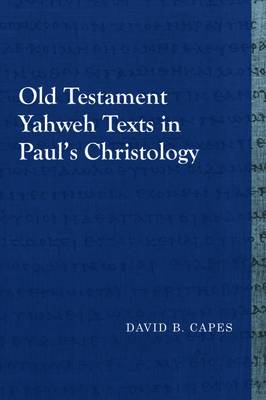
- Retrait gratuit dans votre magasin Club
- 7.000.000 titres dans notre catalogue
- Payer en toute sécurité
- Toujours un magasin près de chez vous
- Retrait gratuit dans votre magasin Club
- 7.000.0000 titres dans notre catalogue
- Payer en toute sécurité
- Toujours un magasin près de chez vous
Description
The earliest Christian communities engaged in bold and imaginative rereadings of their Scriptures--none more astounding and potentially inflammatory than of the passages that focus upon the name and nature of Israel's God. In this volume, David B. Capes tracks the Apostle Paul's use of Old Testament texts that directly invoke God's name, Yahweh, for what they can disclose about the earliest Christian beliefs and practices.
Since Paul writes to his churches in Greek and quotes the Old Testament extensively from the Septuagint, Capes focuses upon Old Testament quotations and allusions in which kyrios translates the divine name. He discovers that Paul applies a majority of his quotations of and allusions to Yahweh texts to the Lord Jesus Christ, thus offering to him designations originally reserved for Israel's God. Given the high regard that Judaism placed upon both Scripture and the divine name in the first century, the application of Yahweh texts to Jesus bears significant christological weight. These texts reveal that Paul considered Jesus to be more than a man or a divine agent--Paul believed that Christ was in some sense Yahweh Himself. Capes thus unveils Paul's strategy for the reading of Scripture, which provides a basis for properly interpreting early Christianity's veneration of Jesus, including prayers and hymns to Christ, the authoritative status attributed to Jesus' words, and the notions of Christ's pre-existence, role in creation, and authority as coming eschatological Savior and Judge. How Paul reread his Bible goes hand-in-glove with the differences that developed between Christianity and Judaism.Spécifications
Parties prenantes
- Auteur(s) :
- Editeur:
Contenu
- Nombre de pages :
- 224
- Langue:
- Anglais
- Collection :
Caractéristiques
- EAN:
- 9781481307918
- Date de parution :
- 15-07-17
- Format:
- Livre broché
- Format numérique:
- Trade paperback (VS)
- Dimensions :
- 152 mm x 229 mm
- Poids :
- 349 g

Les avis
Nous publions uniquement les avis qui respectent les conditions requises. Consultez nos conditions pour les avis.






